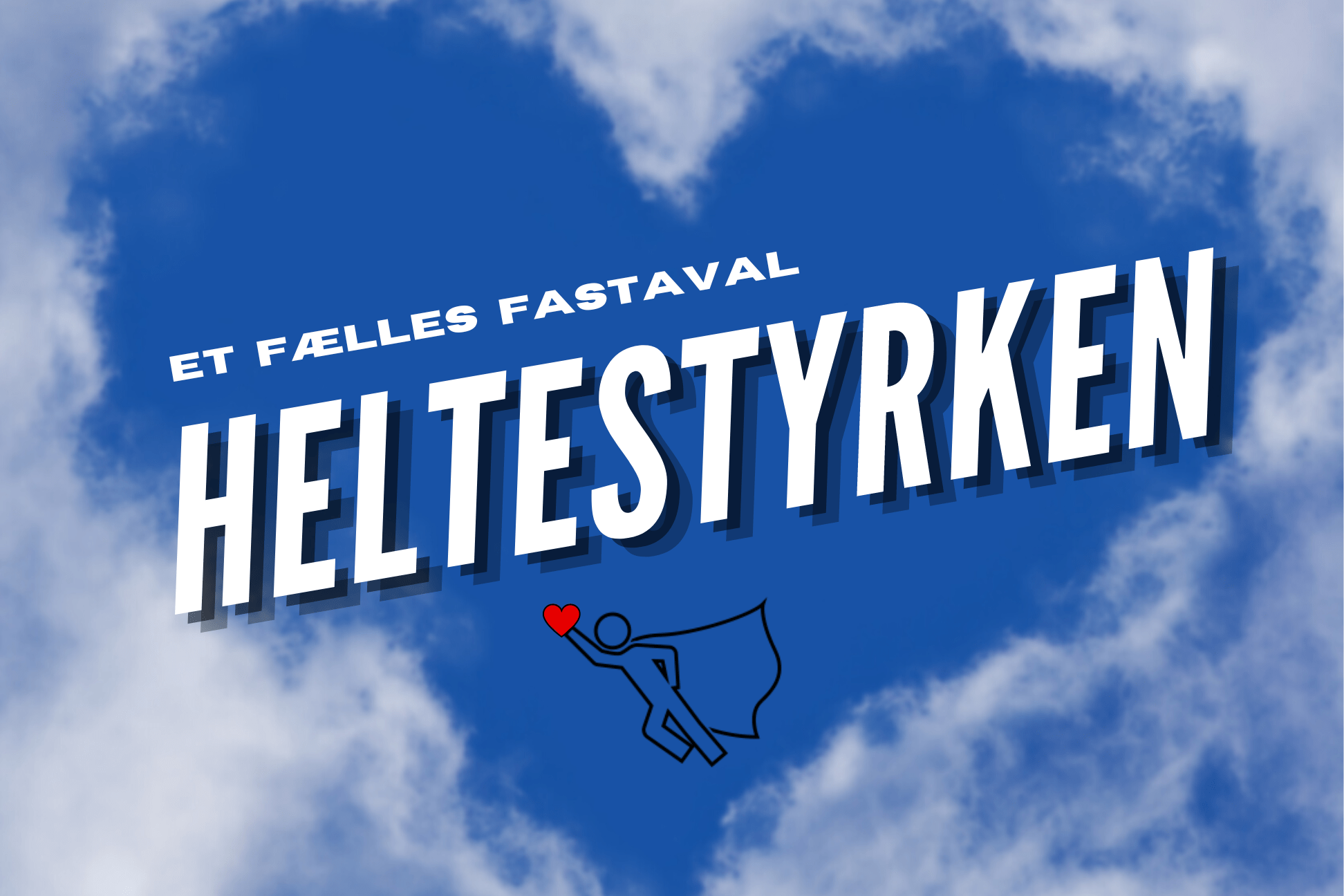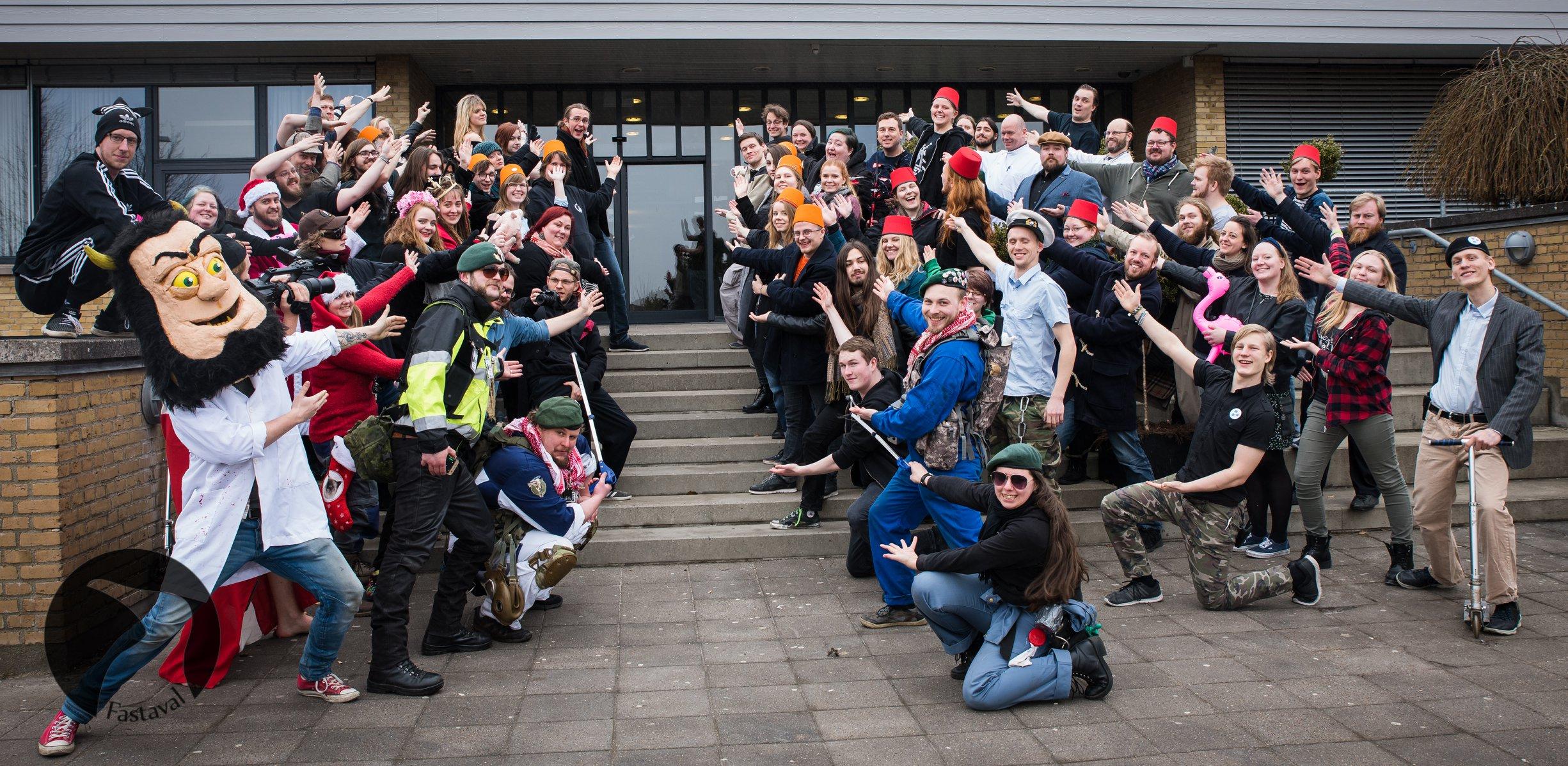A Shared Fastaval
When registering for Fastaval, participants must indicate how they would like to assist with the running of the convention. You can be a game master, rules referee, setup crew, or part of the Hero Force! You can choose as many hero tasks as you like, but at least one. Which hero are you at Fastaval?
- The Hero Force
- Game master
- Game Guide
- The setup team
What is The Hero Force?
Does being a hero make any difference at all? Yes, it certainly does! Especially at Fastaval!
GDS (Gør Det Sammen, or ‘Do It Together’), which has been a big part of Fastaval for many years, has undergone a makeover and become the new network Heltestyrken!
In collaboration with the other heroes, you help give all participants and organisers a better Fastaval experience. Without our heroes, Fastaval cannot run as it should.
Without you, there would be no Fastaval!
It is fantastic participants like you who help keep our Fastaval running. Make a huge difference, become part of the Hero Force!
What does it mean in practical terms to be in the Hero Force?
You will be assigned various hero tasks. Of course, the activities you have signed up for will be taken into account, and no tasks will last longer than 3 hours.
In these roles, you will help the organisers with various tasks and have a unique opportunity to go behind the scenes and get to know some of the many volunteer organisers at Fastaval!
If you need to contact our Hero Team Managers, Magnus Keiding and Christoffer Nissen, you can do so by email: heltestyrken@fastaval.dk or phone: +45 93 90 35 68 (only active during Fastaval)
Examples of previous Hero Strength assignments
- Service and Food Handling: The kiosk involves restocking goods, sales and, of course, customer service. You will gain extensive knowledge of the kiosk, and it is a fantastic way to meet people.
- Coffee Inn: Help out at Otto’s Coffee Inn or help with baking cakes
- Party setup: As the name suggests, this involves setting up for the big Otto party. Setting up tables, chairs and decorations.
- Washing up: The traditional washing-up life. Has been around longer than Dirtbusters, but don’t tell them that.
- Clean-up: Closing and cleaning up the premises on Saturday and Sunday. An important heroic task!

What is a Game master?
The vast majority of scenarios at Fastaval are designed so that there is a game master for the scenario. The game master is the person who has read the scenario in advance, familiarised themselves with the narrative, devices, roles, etc. The scenario is a kind of manual/script that the game master follows and interprets in practice. The game master is the person who conveys the scenario and keeps it on track. They typically do not have a role in the scenario, but may play several small supporting roles.
It is often also an important task for the game master to set the scenes – i.e. describe where and what is happening – and cut the scenes when they are finished.
Why become a game master?
Without game masters, the scenarios cannot be played. This means that as a game master, you are a huge help to Fastaval, assisting the authors in ensuring that their scenarios are played by many people, while also having a great experience yourself.
Game masters are heroes on par with Rule Enforcers and Heroes in the Hero Force, and those who help with Setup and Cleanup. It is a way to lend a hand to the Shared Fastaval we create together.
As a game master, you also have a great opportunity to meet a friend you didn’t know before. It’s a good way to get to know new people. If you have a scenario writer inside you, it’s also a good way to read and think about scenario design so that you can continue working on your own ideas.
What does it mean in practical terms to sign up as a game master?
When you sign up for activities, you can choose to register as a potential game master. You can sign up for one or more scenarios – it’s entirely up to you. You can also sign up to play the same scenario multiple times.
Approximately 14 days after sign-up closes (this is how long it takes to form teams and find the players we always need), you will be informed of the scenarios you will be playing, and the scenario will be sent to you. It is your responsibility to read and familiarise yourself with the scenario before you run it at Fastaval.
Before Fastaval, we have two initiatives to help you prepare for the task:
On the Monday before Easter, there will be an online Game Master Workshop on Discord, where you can ask questions and get help if anything in the scenario is unclear. The workshop will be held by the game masters (those responsible for finding game masters for all teams).
Half an hour before the scenario you are to run begins, there will be a briefing about the scenario with the other players in the scenario and typically the writer, where you can also ask questions.
Typically, the scenario will also indicate how to contact the writer if you have any questions before Fastaval.
How do I become a good game master?
Here are 5 useful tips:
- Familiarise yourself with the scenario well in advance.
If you have read the scenario before Fastaval, you will have much more peace of mind and time to find answers to any questions you may have. This will give you a much better gut feeling.
- Play scenarios that you yourself enjoy playing
If you run a scenario that you yourself would find fun to play, it is much easier for you to know what works and what doesn’t work in the game room.
- You’re good enough to play
Some people worry about whether they are good enough to play at Fastaval, and we can assure you that you are. For one thing, the writers have become really good at writing scenarios, so it’s easy to figure out what to do. For another, we have the world’s best players, and both you and they want to have a good experience. This means that you are not alone in this task. Your players will help you, and together you will create a great experience.
- But I’ve never tried it before!
Don’t worry! Write to spilleder@fastaval.dk , if you want help choosing a good scenario to start your game master career at Fastaval. We would love to help you, because you are a huge help to us by taking on a game master role!
- Have fun and take it easy!
The most important thing is that you relax, enjoy the task, and know that if it doesn’t go quite as you had planned, it will go better next time. We still appreciate you and your help!
What is a Game Guide?
When playing a board game for the first time, it is often helpful to have someone at the table who already knows the game. If you sign up as a game guide in a game block, you take on the role of this person for one of this year’s designer board games, and you are expected to take responsibility for communicating the rules of the game so that the game at your table runs as smoothly as possible. You will have the opportunity to contribute to Fastaval by doing what many board gamers do best: create a good atmosphere at the table and help your fellow players have a good gaming experience.
Why become a Game Guide?
In addition to helping Fastaval, it is also worth noting that rule enforcers are on par with role-playing game masters, the hero force, and the setup team. So if you feel that the role of rule enforcer might be a better way to help out, it is worth considering (you are of course welcome to sign up for as many hero tasks as you want, but it is not a requirement if you are a game guide).
If you are already familiar with one of this year’s games (perhaps you know the designer personally, or you have playtested an earlier prototype of the game, etc.), this is also a great opportunity to share your experiences (and you have probably already done some of the preliminary work of familiarising yourself with the basic mechanics of the game).
What does it mean in practical terms to sign up as a Game Guide?
You will be contacted by the Game Guide coordinators before Fastaval begins and sent the rules of the game so that you can familiarise yourself with the game and be well prepared before Fastaval begins. There will also be an opportunity to meet the game designers at Fastaval, where you can chat and clarify any questions you may have (except in the few cases where the game designer is unable to attend Fastaval itself).
On the day of the game, you are expected to arrive early enough for your game to be set up so that everyone can be ready to play when the game block begins (a good rule of thumb is about 15 minutes before the start of the game, but you and other rule communicators can coordinate otherwise with the game designer if you wish).
How can I become a good Game Guide?
Firstly, it is important to emphasise that this section should not be understood as prescriptive; as long as your game is running smoothly and everyone is having a good gaming experience, you are doing the right thing. Instead, this section is intended as inspiration and a set of tools that you can use if you are new to the field.
Create enjoyment and confidence for others by being well prepared:
The more confident you are in your own understanding of a game, the easier it is to guide others in playing it. It is therefore a good idea to take your preparation work seriously so that you are as well equipped as possible for the task of explaining the rules. Start your preparation work early so that you have the time and opportunity to familiarise yourself with the game as well as possible.
Before your game block starts, it may also be a good idea to briefly inspect the prototypes of the game available at Fastaval so that minor issues (misprints, fragile components, missing pieces, etc.) are discovered before and not during the game.
Test the game before Fastaval (if possible):
After reading through the rules of the game, it may be a good idea, if practical for the game in question, to try to simulate a few game situations (e.g. “Here is the board in a given situation. It is now player no. 1’s turn. They have rolled ⚁,⚄ and are considering their move. What do they do?”). When you try to get an overview of the game’s possible moves and then try to figure out what exactly would be a good move, you quickly find out what you have understood and what you have not understood. If you have trouble understanding what the written rules mean, a small imaginary game situation can also help clarify things. Although it is of course easiest to do such exercises with a copy of the game in front of you, you can often get quite far with just a few pieces of paper and a pencil, where you sketch out a game situation and use it as a starting point.
Coordinate with the game designer on an ongoing basis and at Fastaval:
Make sure you keep the lines of communication open with the game designer and any other Game Guides once you have been put in touch. Exchanging experiences on an ongoing basis can reduce the preparation burden.
At Fastaval itself, it is worth meeting and chatting with your game’s designer, especially because some of the more ‘soft’ aspects of a game (the interplay between mechanics and theme, the designer’s vision for the kind of gaming experience they are trying to create, etc.) are easier to discuss verbally and more informally. Fastaval holds a short block on Wednesday in the board game area where you can meet the designers of this year’s games and have a little chat, and it’s probably worth stopping by.
What do I, as a designer, gain from the Game Guide scheme?
In addition to Game Guide helping your players have a better gaming experience (and thereby helping you get closer to winning the coveted audience award!), there are a number of practical advantages to not being the only one at Fastaval who knows your game in advance. As an individual, it can be quite a challenge to get several tables started with a game at the same time, so having a few extra hands on deck can make the start of your game block more manageable and less stressful. Outside of the game block itself, game guides can also act as ambassadors for your game. They can help build buzz and excitement through their conversations and networks during and after Fastaval (this is not a requirement for rule communicators in any way, but rather a consequence of the fact that people are likely to be interested in your game if they are willing to take on the role).
In terms of pure design, it can also be beneficial to help your game guide familiarise themselves with your game. This gives you the opportunity to find out which aspects of your game are easy/difficult to understand for someone who has not been involved in the entire game development process. You simply get a little extra feedback on top of that when you help your game guides familiarise themselves with the game.
What can I contribute as a designer?
You will be put in touch with your game guide after registration has closed and game guide roles have been distributed among the participants. You can greatly assist your game guide by ensuring clear and concise communication, for example, by inviting people to a Discord server (or perhaps just a Facebook thread) where your game guide can exchange experiences with each other and ask questions. You could organise and invite your rule enforcers to participate in a question and answer session (an online call is probably the most obvious choice) where you can clarify any questions they may have. If you would rather do something physical, you could arrange to meet at Fastaval itself.
You can help find and motivate people to sign up as rule explainers for your game. As a designer, you have probably already played your game with friends and acquaintances to a greater or lesser extent, so you may know a few people who would be able to become good game guide. If any of these people are planning to attend Fastaval, you could encourage them to sign up as game guide for your game. If you have worked with other designers where a group has helped each other during the development process, you can also easily help each other by signing up as rule explainers for each other’s games (since you already know the games, it is a fairly easy and good way to help each other).
Setting up and taking down Fastaval
Setup: Monday and Tuesday during Easter week – Fastaval starts on Wednesday.
Take down: Monday (Easter Monday) after the end of Fastavals on Sunday evening.
The setup and takedown mark the beginning and end of Fastaval. We help each other with this so that we can get started with the convention as quickly as possible. We welcome all the help we can get, so even if you can only come and help for part of the time, we would still love to have you.
What does it mean to be part of the setup team?
Setup begins on Monday morning, with Fastaval taking over the school at 9 a.m. and setup work commencing at 10 a.m. We will then spend until Wednesday at noon setting up rooms for role-playing and generally making the school appealing for participants. During the setup days, we will provide breakfast, lunch, and dinner for all the cool people at the school.
The setup team is happy to help with take down
The take down begins with breakfast on Monday morning at 9 a.m., following a spectacular Ottofest, and we spend the day packing up and cleaning the school so that we can leave it as we found it the week before. This is a task that we accomplish most effectively when we all assist each other and do what we can to complete the tasks. The take down is not complete until everything has been done and the school caretaker has inspected and approved the premises. We provide dinner on Monday, as we usually celebrate the take down with a round of pizza on us when we finish at the school on Monday evening.




